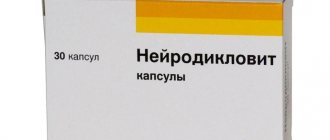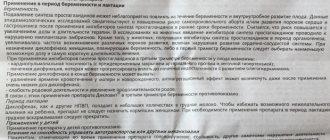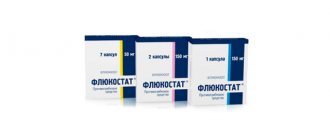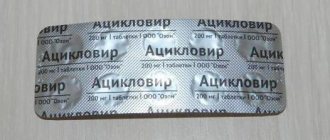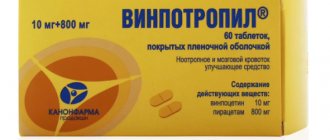Pharmachologic effect:
NSAIDs. Voltaren contains diclofenac sodium, a non-steroidal substance that has a pronounced anti-inflammatory, analgesic and antipyretic effect.
The main mechanism of action of diclofenac, established under experimental conditions, is considered to be inhibition of prostaglandin biosynthesis. Prostaglandins play an important role in the genesis of inflammation, pain and fever.
In rheumatic diseases, the anti-inflammatory and analgesic properties of Voltaren provide a clinical effect, characterized by a significant reduction in the severity of such manifestations of diseases as pain at rest and during movement, morning stiffness and swelling of the joints, as well as an improvement in the functional state.
In case of post-traumatic and postoperative inflammatory phenomena, Voltaren quickly relieves pain (arising both at rest and during movement), reduces inflammatory swelling and swelling of the postoperative wound.
When using Voltaren in tablets and suppositories, a pronounced analgesic effect of the drug was noted for moderate and severe pain of non-rheumatic origin.
It was also found that Voltaren is able to reduce pain and reduce blood loss during primary dysmenorrhea.
In what cases is Voltaren prescribed?
The medicine has a wide range of effects. The medicine is prescribed for the treatment of:
- osteochondrosis;
- spondyloarthritis;
- osteoarthritis;
- rheumatoid arthritis;
- severe pain in the ridge;
- joint pain;
- gout;
- serious injury;
- pain and swelling;
- severe migraine.
For each illness, a certain dose of medicine is prescribed. So you should definitely consult a doctor to determine course therapy for a specific disease.
Indications for use:
- inflammatory and degenerative diseases of the musculoskeletal system, incl. rheumatoid, juvenile, chronic arthritis; ankylosing spondylitis and other spondyloarthropathy; osteoarthritis; gouty arthritis; bursitis, tendovaginitis;
- pain syndromes from the spine (lumbago, sciatica, ossalgia, neuralgia, myalgia, arthralgia, radiculitis);
- post-traumatic postoperative pain syndrome accompanied by inflammation (for example, in dentistry and orthopedics);
- algodismenorrhea;
- inflammatory processes in the pelvis (including adnexitis);
- infectious and inflammatory diseases of the ENT organs with severe pain syndrome (as part of complex therapy): pharyngitis, tonsillitis, otitis media.
Isolated fever is not an indication for the use of the drug.
The drug is intended for symptomatic therapy, reducing pain and inflammation at the time of use, and does not affect the progression of the disease.
Compound
The main active ingredient is diclofenac sodium. 3 ml of the product contains up to 75 mg of this compound.
Voltaren (solution) includes the following auxiliary components:
- beckons;
- sodium hydroxide;
- propylene glycol;
- benzyl alcohol;
- water for injections;
- sodium metabisulfite, etc.
The drug is packaged in glass ampoules of 3 ml. They are placed in cardboard packs of 5 pieces.
Directions for use and dosage:
The dose is selected individually; it is recommended to use the drug in the minimum effective dose, with the shortest possible treatment period.
The tablets should be swallowed whole with liquid, preferably before meals.
For adults, the recommended starting dose is 100-150 mg per day. In relatively mild cases of the disease, as well as for long-term therapy, 75-100 mg per day is sufficient. The daily dose should be divided into several doses.
To relieve night pain or morning stiffness, in addition to taking the drug during the day, diclofenac is prescribed in the form of rectal suppositories before bedtime; in this case, the total daily dose should not exceed 150 mg.
For primary dysmenorrhea, the daily dose is selected individually; usually it is 50-150 mg. The initial dose should be 50-100 mg; if necessary, over several menstrual cycles it can be increased to 150 mg per day. The drug should be started when the first symptoms appear. Depending on the dynamics of clinical symptoms, treatment can be continued for several days.
Patient reviews
- Igor, 40 years old. “To treat a severe muscle strain in my leg during exercise, the doctor prescribed me Voltaren Emulgel. Before using the drug, I could not walk at all because of the pain. After applying the gel, I wrapped my leg with a special bandage and left it overnight. By morning there was almost no pain.”
- Elena, 42 years old. “The doctor prescribed me Voltaren injections for cervical osteochondrosis to relieve pain, swelling and stiffness. After 2 injections, all unpleasant symptoms disappeared.”
The article belongs to the site When copying, an active, indexed link to the source is required.
Contraindications:
- exacerbation of gastric and duodenal ulcers in the acute phase, ulcerative bleeding, perforation;
- inflammatory bowel diseases (Crohn's disease, ulcerative colitis) in the acute phase;
- patients with attacks of bronchial asthma, urticaria or acute rhinitis, which are provoked by taking acetylsalicylic acid or other NSAIDs;
- severe renal failure (creatinine clearance less than 30 ml/min);
- severe heart failure;
- severe liver failure;
- active liver disease;
- conditions accompanied by a risk of bleeding;
- coronary artery bypass grafting (perioperative period);
- confirmed hyperkalemia;
- III trimester of pregnancy;
- lactation period (breastfeeding);
- hypersensitivity to the components of the drug.
Voltaren contains lactose and is therefore not recommended for patients with rare hereditary galactose intolerance, severe lactase deficiency and glucose-galactose malabsorption.
It is not recommended to use Voltaren enteric-coated tablets, 50 mg, in children under 14 years of age.
How many days can you inject?
The injection is performed once a day; for intense pain, the drug is administered 2 times a day. He recommends injecting the drug for 1-2 days, after which the patient is transferred to taking oral NSAIDs.
Long-term use of the drug in solution form is not recommended due to the high risk of adverse reactions.
This medicine can be injected for no more than 5 days. What do you think are the most important factors when choosing a medical facility?
Voltaren®
When using the drug Voltaren® and other NSAIDs, careful medical monitoring is necessary for patients who have symptoms/signs indicating gastrointestinal lesions/diseases or ulcerative lesions of the stomach or intestines, bleeding or perforation, a history of Helicobacter pylori infection, ulcerative colitis, Crohn's disease , a history of liver dysfunction, or patients presenting with complaints indicating gastrointestinal diseases. The risk of developing gastrointestinal bleeding increases with increasing doses of NSAIDs or with a history of ulcers, especially bleeding and perforation of the ulcer and in elderly patients.
When using diclofenac, phenomena such as bleeding or ulceration/perforation of the gastrointestinal tract, in some cases with fatal outcome, were observed. These events may occur at any time when using drugs in patients with or without previous symptoms and a history of serious gastrointestinal diseases. In elderly patients, such complications can have serious consequences. If bleeding or gastrointestinal ulceration develops in patients receiving Voltaren®, the drug should be discontinued.
To reduce the risk of toxic effects on the gastrointestinal tract, patients with gastrointestinal ulcers, especially those complicated by bleeding or a history of perforation, as well as elderly patients, should be prescribed the drug in the minimum effective dose.
Patients with an increased risk of developing gastrointestinal complications, as well as patients receiving therapy with low doses of acetylsalicylic acid, should take gastroprotectors (proton pump inhibitors or misoprostol). Or other medications to reduce the risk of unwanted effects on the gastrointestinal tract.
Patients with a history of gastrointestinal lesions, especially the elderly, should report all abdominal symptoms to the doctor.
Particular caution should be exercised when using the drug Voltaren® in patients receiving drugs that increase the risk of gastrointestinal bleeding: systemic corticosteroids (including prednisolone), anticoagulants (including warfarin), antiplatelet agents (including clopidogrel, acetylsalicylic acid) or selective serotonin reuptake inhibitors (including citalopram, fluoxetine, paroxetine, sertraline).
Particular caution is required when treating patients with cardiovascular diseases (including ischemic heart disease, cerebrovascular diseases, compensated heart failure, peripheral vascular disease), impaired renal function (including chronic renal failure, CC 30-60 ml/min), with dyslipidemia/hyperlipidemia, diabetes mellitus, arterial hypertension, patients receiving diuretics or other drugs that affect renal function, as well as patients with a significant decrease in blood volume of any etiology, for example, in the periods before and after major surgical interventions; when treating smoking patients or patients who abuse alcohol.
NSAID therapy, incl. Diclofenac, particularly long-term and high-dose therapy, may be associated with a small increase in the risk of serious cardiovascular thrombotic complications (including myocardial infarction and stroke). To reduce the risk of these complications, especially in patients with cardiovascular disease, NSAIDs should be taken at the lowest effective dose for the shortest possible duration of treatment.
During therapy with Voltaren®, it is recommended to monitor renal function in patients with arterial hypertension, impaired cardiac or renal function, elderly patients, patients receiving diuretics or other drugs that affect renal function, as well as in patients with a significant decrease in blood volume of any etiology, for example, in the period before and after major surgical interventions. After cessation of drug therapy, normalization of renal function indicators to baseline levels is usually observed.
Caution should be exercised when using the drug Voltaren® in elderly patients, especially in weakened or low-weight elderly people (in such cases, the drug should be prescribed in the minimum effective dose).
Serious dermatological reactions such as exfoliative dermatitis, Stevens-Johnson syndrome, toxic epidermal necrolysis, in some cases fatal, have been reported very rarely with the use of diclofenac. The highest risk and incidence of severe dermatological reactions were observed in the first month of treatment with diclofenac. If patients receiving Voltaren® develop the first signs of skin rash, damage to the mucous membranes or other symptoms of hypersensitivity, the drug should be discontinued.
Since during the period of use of the drug Voltaren® there may be an increase in the activity of one or more liver enzymes, during long-term therapy with the drug, monitoring of liver function is indicated as a precaution. If liver dysfunction persists or progresses or signs of liver disease or other symptoms (eg, eosinophilia, rash) occur, the drug should be discontinued. It should be borne in mind that hepatitis during the use of the drug Voltaren® can develop without prodromal phenomena.
Caution is necessary when using the drug Voltaren® in patients with mild to moderate liver dysfunction, as well as in patients with hepatic porphyria, because the drug can provoke attacks of porphyria.
Voltaren® may temporarily inhibit platelet aggregation. Therefore, in patients with hemostasis disorders, it is necessary to carefully monitor relevant laboratory parameters.
With long-term use of the drug Voltaren®, it is recommended to conduct regular clinical tests of peripheral blood.
In rare cases, anaphylactic/anaphylactoid reactions have been observed in patients who are not allergic to diclofenac when using Voltaren®.
Exacerbation of asthma (NSAID intolerance/NSAID-induced asthma), angioedema, and urticaria are most common in patients with asthma, seasonal allergic rhinitis, nasal polyps, COPD, or chronic respiratory infections (especially those associated with allergic rhinitis-like symptoms) . In this group of patients, as well as in patients with allergies to other drugs (rash, itching or urticaria), special caution (preparedness for resuscitation measures) should be taken when prescribing Voltaren®.
The anti-inflammatory effect of the drug Voltaren® may complicate the diagnosis of infectious processes.
Voltaren® should not be prescribed together with other NSAIDs, including selective COX-2 inhibitors, due to the risk of increased adverse reactions.
Impact on the ability to drive vehicles and operate machinery
Patients who experience visual disturbances, dizziness, drowsiness, vertigo or other disorders of the central nervous system while using the drug Voltaren® should not drive vehicles or operate machinery.
